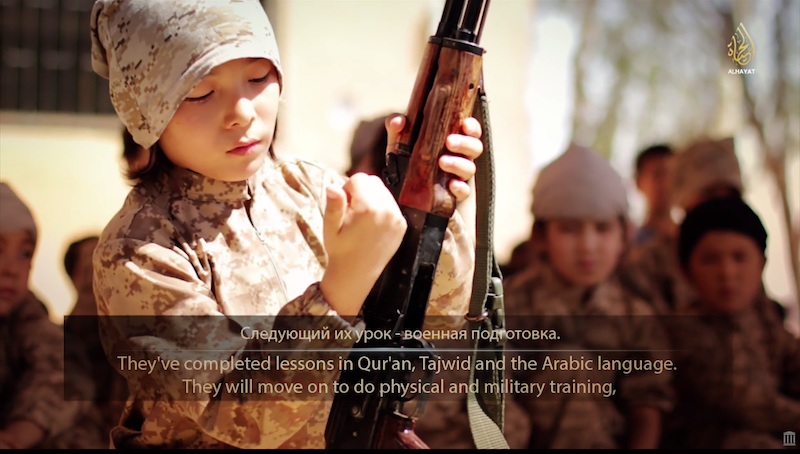Get the weekly SPARTANAT newsletter.
Your bonus: the free E-Book from SPARTANAT.

TERRORISM (5): Small lexicon of jihadist culture
The text discusses the five central concepts of Salafist Jihadism: Jihad, Takfir, Al-Walā’ wa-l-barā, Tauhid, Hakimiyya. These concepts are crucial in the rhetoric of Jihadists and have evolved in meaning within jihadist culture.
Terror groups like Al-Qaeda and the "Islamic State" follow the idea of "Salafist Jihadism". This complex ideology can be explained through five central and interconnected concepts that hold a special place in the literature, pop culture, and rhetoric of Jihadists: Jihad, Takfir, Al-Walā’ wa-l-barā, Tauhid, and Hakimiyya.
The five concepts discussed here can also be found in general Islamic tradition and history. However, they have undergone a significant change in meaning due to jihadist culture. Islamic debates often revolve around confusion of terms. It is not always clear who has the authority to interpret them.
Jihad
Hardly any term polarizes in relation to Islam as much as that of "Jihad". Linguistically, it means faith-directed efforts, in the strict sense, armed struggle for faith.
Jihad enjoys a central place in the writings and speeches of groups like Al-Qaeda or the "Islamic State": Yusuf al-Ayeri, the first leader of Al-Qaeda in Saudi Arabia, characterized it as one of the rituals that traditionally form the core of Islam. Abū Mus’ab az-Zarqāwī, one of the leading figures in the fight against the US occupation in Iraq, spoke of continuing the fight until Judgment Day, and the Salafist cleric Abu Qatada described Jihad as the "identity of the Muslim in his existence".
The idea of the "Holy War" can be traced back in Islam to Muhammad's migration to Medina. It refers to both defensive measures – such as the fight against foreign invaders like the US occupation of Iraq in 2003 – and the conquest of new territories. The origin of global (Salafist) Jihadism can be traced back to Abdallah Azzam, who, on the occasion of the Soviet invasion of Afghanistan, formulated the duty of every Muslim to engage in armed struggle against unbeliever usurpers.
Azzam made Jihad a cornerstone of faith, on par with fasting and prayer. He also referred to a statement made by the spiritual forethinker of the Muslim Brotherhood, Sayyid Qutb: "If Jihad were a temporary phenomenon of Islam, the Messenger of Allah would not have said to every Muslim until the Day of Judgment, 'Whoever dies without having fought in Jihad, or without having resolved to do so, dies on a branch of hypocrisy'."
The obligation to Jihad formulated by Azzam was followed by numerous Arab fighters (Mujahideen), and upon their return, the ideology was brought into the Arab regions: henceforth, apostate countries and regimes subservient to the West were to be fought against, as well as the USA and its presence in the Middle East. Additionally, Osama bin Laden began the idea of the fight against the West as the root of all suffering in the Islamic world. The enemy was thus "the West" with its global state system and all its accompanying features – international law, banking, development aid, and international organizations like the United Nations – seen as tools of modern colonialism. The "Islamic State" has continued this fight against the West and everything considered "Western". Accordingly, its propaganda magazines always contain challenges and references to the perpetual Jihad:
"We will not rest our Jihad anywhere other than among the olive trees of Rome."
This sentence is on every cover of the IS magazine "Rumiyah" (Arabic for Rome – the conquest of Rome has a central place in the ideology of the "Islamic State").
Takfir
Takfir refers to the process in which another Muslim or a whole group is declared to have fallen from faith (apostasy).
This is also related to the definition of the unbeliever – Kuffar. Dhimmi, primarily Jews and Christians, as members of the religion of the Book and the faith in one God, have a restricted legal status in the Islamic community when paying their own tax. Even the "Islamic State" adhered to this principle and proudly declared to grant the Christians living in its territory the right to residence. They were given the choice to convert or pay a special tax – refusal would result in the death penalty.
Professing faith alone is not enough to be considered a Muslim. Islam must also be practiced and actively lived: through prayer, alms, fasting, and pilgrimage. Unlike the Roman Catholic Church, there are hardly any (objective) formalities for exclusion from the faith community. Thus, Takfir can serve as a means of pressure to deny (religious) legitimacy to (Western-oriented) reformers or other rival groups, or to justify the fight against them. The "Islamic State" has gone as far as declaring the entire Shiite community as unbelievers.
Conversely, the mistaken application of Takfir is considered a fall from faith, which is why numerous leading clerics call for caution in this regard.
There is no central authority for such questions – as is generally the case for the interpretation of the Quran and Islamic law. Therefore, members of the "Islamic State" can also be declared unbelievers.
Al-Walā‘ wa-l-barā
This – extremely vaguely formulated – concept deals with the behavior of Muslims and the highly personal duty to differentiate oneself from non-Muslims: be it through clothing, greetings, or customs, but ultimately also through the avoidance of communal action. Accordingly, it overlaps with Takfir. The aim is to strengthen group cohesion and prevent the contamination of faith by foreign doctrines. Since the end of the Soviet occupation of Afghanistan, it has served as an instrument to mobilize believers against their own governments.
Therefore, Muslim (group) identity and loyalty of members are emphasized as a separation from modern lifestyles and their proponents. Alliances with foreign and hostile cultures are therefore prohibited; Muslims should rather stick together and trust only each other. Like Takfir, this concept can be used to deny legitimacy to states or governments (Saudi Arabia due to cooperation with the USA) or (armed) groups.

Propaganda scene from an IS video: weapon training, learning Arabic, and instruction in the correct Monotheism (Tajwid/Tauhid).
Tauhid
Tauhid refers to the belief in only one – almighty – God, the most significant pillar of Islam. The monotheistic belief serves two purposes: firstly, as a basis for unity among Muslims, and secondly, it is directed against any risk of polytheism and idolatry (Shirk).
Tauhid gained significance as a political tool after the September 11 attacks. Osama bin Laden, in one of his first speeches after the attacks, declared that his understanding of Tauhid demands a struggle with the USA: the implementation of Tauhid is intrinsically linked to the establishment of belief itself. It rejects the recognition of tyrannical governments such as that of Saudi Arabia and political compromises with enemies. This ultimately leads to the obligation of armed struggle: Jihad means practically implementing the essence of Islam – the belief in Allah and Allah alone.
Hakimiyya
Over the years, the concept of Hakimiyya has established itself as a subset of monotheistic belief, elevating government affairs to a religious question. Hakimiyya is the response to the idea of secularism. According to this, Allah and His law reign universally, including in political matters. In the jihadist understanding of Islam, there is no foundation similar to the biblical saying "Render to Caesar the things that are Caesar's, and to God the things that are God's" for a separation between church and state. By making people lawmakers and emphasizing the individual's freedom rights, concepts like secularism, democracy, or secularism promote polytheism and idolatry.
In this context, the concept of Dschāhilīya, coined by Sayyid Qutb, is also significant: in his book "Milestones" from 1964, he described not only the capitalist West and the communist East but also the various Islamic states (Qutb himself was convicted and hanged in Egypt in 1966 for alleged participation in a conspiracy against Nasser). It describes the societal disregard for divine guidance, which "is based on rebellion against God's rule on Earth. It transfers the greatest attributes of God, namely sovereignty, to man and makes some people rulers over others […] it claims the right to determine values, to enact laws for coexistence, and to determine fate without obeying God's commandments."
Building on Qutb's basic idea, jihadists – at least in theory – cannot compromise on the question of the right form of state. This also necessitates a comprehensive and revolutionary – ultimately forcefully induced – transformation of the respective state and social system, up to the international community of states. These are the steps that the "Islamic State" has consistently implemented.
ADDENDUM Article series on Terrorism on SPARTANAT:
Part 1: Criminals, Heroes, Freedom Fighters
Part 2: The History of Terrorism in Europe, Visualized
Part 3: What's New in New Terrorism?
Part 4: The German Autumn 1977
More to come …
This article was first published on ADDENDUM. Copyright Text: ADDENDUM. Graphics: IS.
ADDENDUM online: www.addendum.org
SPARTANAT is the online magazine for Military News, Tactical Life, Gear & Reviews.
Send us your news: [email protected]
Ad
similar
Get the weekly SPARTANAT newsletter.
Your bonus: the free E-Book from SPARTANAT.





